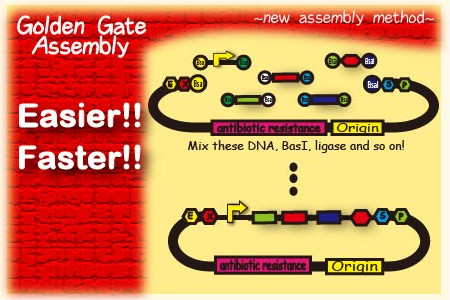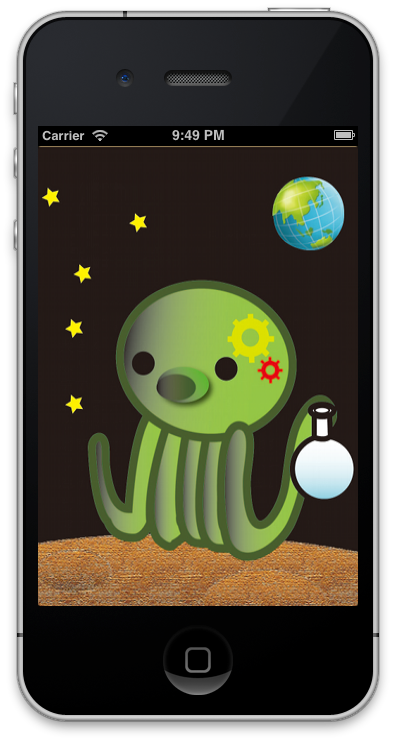Team:Kyoto
From 2012.igem.org
(→link=) |
(→link=) |
||
| (104 intermediate revisions not shown) | |||
| Line 4: | Line 4: | ||
=[[File:Kyoto_OurProject.png|link=|180px]]= | =[[File:Kyoto_OurProject.png|link=|180px]]= | ||
==[[File:Kyoto_FlowerFairyEcoli.png|link=]]== | ==[[File:Kyoto_FlowerFairyEcoli.png|link=]]== | ||
| - | How wonderful would it be, if you | + | How wonderful would it be, if you could see flowers in full glory throughout the year? If flowers were to bloom at will, you could eat tasty fruits and see beautiful flowers any time you want. This is what we have been looking for: the technology to make flowers bloom. There is a plant hormone that enables us to realize this dream. The plant hormone, Florigen, controls and triggers flowering in plants. This year, we aimed to create [[Team:Kyoto/Project|'''Flower Fairy E.coli''']]. They will produce Florigen and transfer it into plant cells! With our Flower Fairy E. coli, you can make flowers bloom anytime! |
| + | |||
| + | <html> | ||
| + | <style type="text/css"> | ||
| + | #kyoto-movie { | ||
| + | margin: auto; | ||
| + | width: 650px; | ||
| + | height: 404px; | ||
| + | overflow: hidden; | ||
| + | position: relative; | ||
| + | } | ||
| + | #kyoto-frame { | ||
| + | margin-left: 43px; | ||
| + | height: 404px; | ||
| + | width: 568px; | ||
| + | position: absolute; | ||
| + | z-index: 100; | ||
| + | } | ||
| + | #kyoto-movie-base { | ||
| + | width: 2350px; | ||
| + | height: 404px; | ||
| + | padding: 0px 135px; | ||
| + | background-image: url(https://static.igem.org/mediawiki/2012/5/5e/Kyoto_Nega.png); | ||
| + | position: absolute; | ||
| + | z-index: 50; | ||
| + | } | ||
| + | #kyoto-movie-base > img { | ||
| + | margin: 60px -2px; | ||
| + | padding: 0px; | ||
| + | width: 400px; | ||
| + | height: 284px; | ||
| + | } | ||
| + | #kyoto-click { | ||
| + | position: absolute; | ||
| + | z-index: 150; | ||
| + | margin-left: 150px; | ||
| + | margin-top: 20px; | ||
| + | } | ||
| + | </style> | ||
| + | <script type="text/javascript"> | ||
| + | function moveRight() { | ||
| + | var base = $("#kyoto-movie-base"); | ||
| + | var left = base.position().left - 404; | ||
| + | if (left < -1612) left =-1612; | ||
| + | base.animate({ | ||
| + | "left" : left+"px" | ||
| + | },500); | ||
| + | } | ||
| + | function moveLeft() { | ||
| + | var base = $("#kyoto-movie-base"); | ||
| + | var left = base.position().left + 404; | ||
| + | if (left > 0) left = 0; | ||
| + | base.animate({ | ||
| + | "left" : left+"px" | ||
| + | },500); | ||
| + | } | ||
| + | function clear() { | ||
| + | } | ||
| + | $(function() { | ||
| + | $("#kyoto-movie").click(function(event){ | ||
| + | var x = event.pageX-$(this).offset().left; | ||
| + | if (x < 93) { return; } | ||
| + | if (x > 560) { return; } | ||
| + | if (x < 320) { moveLeft(); } | ||
| + | else if (x > 320) { moveRight(); } | ||
| + | $("#kyoto-click").css("display","none"); | ||
| + | }); | ||
| + | }); | ||
| + | </script> | ||
| + | <div id="kyoto-movie"> | ||
| + | <img id="kyoto-frame" src="https://static.igem.org/mediawiki/2012/1/1f/Kyoto_Frame.png"></img> | ||
| + | <div id="kyoto-movie-base"> | ||
| + | <img src="https://static.igem.org/mediawiki/2012/f/f0/Kyoto_Movie0.png"></img> | ||
| + | <img src="https://static.igem.org/mediawiki/2012/e/e1/Kyoto_Movie1.png"></img> | ||
| + | <img src="https://static.igem.org/mediawiki/2012/f/f2/Kyoto_Movie2.png"></img> | ||
| + | <img src="https://static.igem.org/mediawiki/2012/3/33/Kyoto_Movie3.png"></img> | ||
| + | <img src="https://static.igem.org/mediawiki/2012/1/1e/Kyoto_Movie4.png"></img> | ||
| + | </div> | ||
| + | <img id="kyoto-click" src="https://static.igem.org/mediawiki/2012/6/62/Kyoto_Click.png"></img> | ||
| + | </div> | ||
| + | </html> | ||
==[[File:Kyoto_GoldenGateAssembly.png|link=]]== | ==[[File:Kyoto_GoldenGateAssembly.png|link=]]== | ||
| - | Have you ever hoped for a faster | + | Have you ever hoped for a faster method for experiments? We guess you have. In order to achieve a successful study, we have to experiment day by day. This is the case for iGEM, too. iGEMers tend to experiment on ''Escherichia.coli'', and almost all experiments take a lot of time. Unless our guess is wrong, all scholars and iGEMers undergo hardships that make it seemly impossible to complete their work by a deadline. [[Team:Kyoto/Project|'''Golden Gate assembly''']] made up by Carola Engler, Romy Kandzia, Sylvestre Marillonnet enables us to construct genes faster than any other assembly methods. |
| - | [[File:Kyoto_GoldenGateAssembly.jpg]] | + | [[File:Kyoto_GoldenGateAssembly.jpg | link=https://2012.igem.org/Team:Kyoto/Project]] |
| - | [[File:Kyoto_GoldenPrimerDesigner.jpg]] | + | [[File:Kyoto_GoldenPrimerDesigner.jpg | link=https://2012.igem.org/Team:Kyoto/Project]] |
<br clear="both" /> | <br clear="both" /> | ||
=[[File:Kyoto_HumanPractice.png|link=]]= | =[[File:Kyoto_HumanPractice.png|link=]]= | ||
| - | This year, we implemented | + | This year, we implemented '''nine projects''' on [[Team:Kyoto/Consideration|"'''human practice'''"]]. <br> |
| - | Especially, we | + | Especially, we gave high priority to two programs, "Making iPhone app" and "Educational program" <br> |
We created an iPhone app named "iColi" which is a way to bring Japanese closer to synthetic biology. | We created an iPhone app named "iColi" which is a way to bring Japanese closer to synthetic biology. | ||
| - | In addition, we carried out a lecture | + | In addition, we carried out a lecture on synthetic biology and biochemistry at many places, Hibiya high school; Horikawa high school, Kyoto University, and so on. |
| - | + | Our activities this year actually helped many people know about synthetic biology and gene recombination. | |
| - | <font size=" | + | <font size="5">Application</font><br> |
---- | ---- | ||
[[File:Kyoto_iColi0.png|right|300px]] | [[File:Kyoto_iColi0.png|right|300px]] | ||
| - | + | One of the main projects is to create an iPhone app to help many Japanese know about synthetic biology. | |
| - | + | ||
| + | We set the project because some Japanese people seemed to have a bad impression of gene recombination, and we wanted to modify this bias. | ||
| - | + | In addition, few Japanese people know what gene recombination is all about, so we would like to show them how wonderful recombination is. | |
| - | + | ||
| - | + | ||
| - | + | ||
| - | |||
| - | + | <font size="5">Education</font><br> | |
| - | + | ||
| - | <font size=" | + | |
---- | ---- | ||
| + | The second project is to introduce the synthetic biology to high school students, as we would like many high school students to participate in iGEM. | ||
| + | This summer, we carried out lectures on gene recombination and biochemistry in "Seiryo festival" at Hibiya high school, furthermore we held a poster session in open campus of Kyoto University. | ||
| - | + | Due to the curriculum in our country, it is rather difficult for high school students to take part in iGEM undergraduate category, so we told them about the HS division and support students who are interested in it. We hope that many Japanese teams take part in the next iGEM HS division.<br> | |
| - | <br> | + | |
| - | <font size=" | + | <font size="5">Other activities</font><br> |
---- | ---- | ||
| + | *Kyoto University Academic day<br> | ||
| + | *November Festival and Open Campus at Kyoto University<br> | ||
| + | *Science agora<br> | ||
| + | *Tie-up with Super Science High school<br> | ||
| + | *Cooperation<br> | ||
| + | *Symposium on liberal arts and general education<br> | ||
| - | + | <br style="clear: both;" /> | |
=[[File:Kyoto_Criteria.png|link=]]= | =[[File:Kyoto_Criteria.png|link=]]= | ||
| - | You can see at [https://igem.org/2012_Judging_Form?id=797 here]. | + | You can see it at [https://igem.org/2012_Judging_Form?id=797 here]. |
=[[File:Kyoto_Sponsors.png]]= | =[[File:Kyoto_Sponsors.png]]= | ||
| - | <div style="background-color: #ffffff;"> | + | <div style="background-color: #ffffff; border: 1px solid #888888; padding: 10px;"> |
| + | [[File:Leave_a_Nest.jpg | link=http://www.cactus.co.jp/aboutus/partners.html|110px|right]] | ||
[[File:KUlogo.png | link=http://www.kyoto-u.ac.jp/|250px]] | [[File:KUlogo.png | link=http://www.kyoto-u.ac.jp/|250px]] | ||
| - | [[File:CosmoBio.png | link=http://www.cosmobio.co.jp/| | + | [[File:CosmoBio.png | link=http://www.cosmobio.co.jp/|250p]] |
| - | [[File:IDTLogo2010.png | link=http://www.idtdna.com/site| | + | [[File:IDTLogo2010.png | link=http://www.idtdna.com/site|220px]] |
[[File:MBLlogo.gif | link=http://www.mbl.co.jp/e/index.html]] | [[File:MBLlogo.gif | link=http://www.mbl.co.jp/e/index.html]] | ||
| + | <br clear="both"/> | ||
</div> | </div> | ||
</div> | </div> | ||
{{Kyoto/footer}} | {{Kyoto/footer}} | ||
Latest revision as of 16:34, 26 October 2012
Contents |
How wonderful would it be, if you could see flowers in full glory throughout the year? If flowers were to bloom at will, you could eat tasty fruits and see beautiful flowers any time you want. This is what we have been looking for: the technology to make flowers bloom. There is a plant hormone that enables us to realize this dream. The plant hormone, Florigen, controls and triggers flowering in plants. This year, we aimed to create Flower Fairy E.coli. They will produce Florigen and transfer it into plant cells! With our Flower Fairy E. coli, you can make flowers bloom anytime!







Have you ever hoped for a faster method for experiments? We guess you have. In order to achieve a successful study, we have to experiment day by day. This is the case for iGEM, too. iGEMers tend to experiment on Escherichia.coli, and almost all experiments take a lot of time. Unless our guess is wrong, all scholars and iGEMers undergo hardships that make it seemly impossible to complete their work by a deadline. Golden Gate assembly made up by Carola Engler, Romy Kandzia, Sylvestre Marillonnet enables us to construct genes faster than any other assembly methods.
This year, we implemented nine projects on "human practice".
Especially, we gave high priority to two programs, "Making iPhone app" and "Educational program"
We created an iPhone app named "iColi" which is a way to bring Japanese closer to synthetic biology.
In addition, we carried out a lecture on synthetic biology and biochemistry at many places, Hibiya high school; Horikawa high school, Kyoto University, and so on.
Our activities this year actually helped many people know about synthetic biology and gene recombination.
Application
One of the main projects is to create an iPhone app to help many Japanese know about synthetic biology.
We set the project because some Japanese people seemed to have a bad impression of gene recombination, and we wanted to modify this bias.
In addition, few Japanese people know what gene recombination is all about, so we would like to show them how wonderful recombination is.
Education
The second project is to introduce the synthetic biology to high school students, as we would like many high school students to participate in iGEM. This summer, we carried out lectures on gene recombination and biochemistry in "Seiryo festival" at Hibiya high school, furthermore we held a poster session in open campus of Kyoto University.
Due to the curriculum in our country, it is rather difficult for high school students to take part in iGEM undergraduate category, so we told them about the HS division and support students who are interested in it. We hope that many Japanese teams take part in the next iGEM HS division.
Other activities
- Kyoto University Academic day
- November Festival and Open Campus at Kyoto University
- Science agora
- Tie-up with Super Science High school
- Cooperation
- Symposium on liberal arts and general education
You can see it at here.
 "
"














